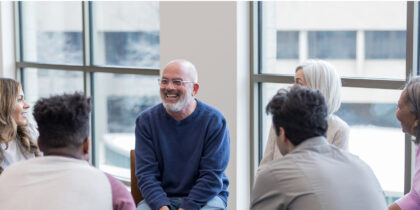Peer support – provided by people with lived experience of mental health difficulties – is increasingly recognised as an important and potentially revolutionary element of mental health care. Indeed, NHS England’s Five Year Forward View for Mental Health referred to peer support as one of the ‘slow burn, high impact’ interventions that should be seen as ‘essential’ to the future of the NHS. And there is growing evidence that peer support has multiple benefits: it can be an opportunity for people who have experienced mental health difficulties to take on new roles; it can help people in different ways to professional-led support; and it can help bring about culture and system change in mental health services.
Centre for Mental Health was commissioned by Health Education England to explore the implications of expanding mental health peer support for specific groups of people:
- Children and young people (briefing written by Dr Louise Theodosiou and Oliver Glick)
- LGBTQ+ people (briefing written by Jess Borthwick, Lara Jaffey and Juliet Snell)
- Older people (briefing written by Toby Williamson and Dr Graham Durcan)
- People with learning disability and neuro-diverse communities (briefing written by Christine-Koulla Burke and Claire Hodgson).
These briefings bring together the key research about how peer support works for each group, as well as the experiences of these groups themselves and examples of good practice across the country.




